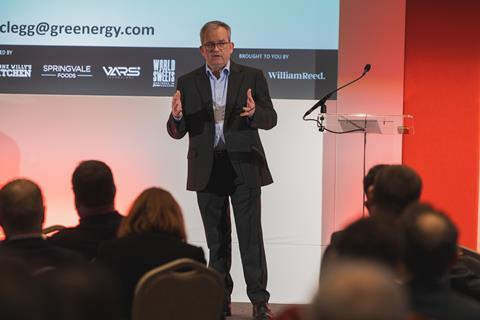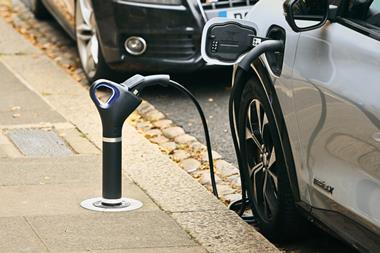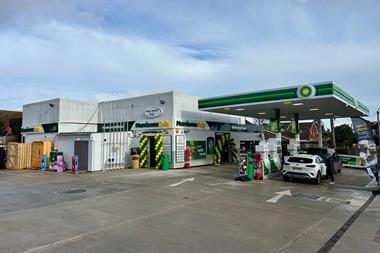
The future of fuel on the forecourt is very much a mix of the traditional and the alternative, but it’s a future we can all look forward to thanks to the passion, creativity and determination of the sector’s independent operators.
That was the rousing message from Paul Clegg, head of independent retail at Greenergy, at last week’s Forecourt Trader Summit, who added: “I’m very confident that fossil fuels will continue to be a significant share of consumer fuel demand going forward, and those fuels will continue to evolve.”
And Clegg knows more than a thing or two about fuel as Greenergy currently supplies around a quarter of the UK’s road fuel. The company sells almost 1.5 billion litres of diesel and unleaded annually to more than 350 Esso sites in the UK, 250 of which are within the independent retail sector, with Clegg and his team managing the commercial relationship with the owners and operators of those sites.
Clegg began his address by speaking about the big four challenges faced by forecourts: costs, crime, legislation and the future; but he chose to use his time at the podium to talk about the future, and specifically what the future holds for forecourts with regards to the decreasing demand for traditional road fuels.
“Excuse me, while I try and find a crystal ball somewhere,” he joked, then added: “We are seeing a decline in demand for traditional road fuels. Gasoline is outperforming diesel and, weirdly, some of that outperformance is driven by the growth in hybrid vehicles, which tend to be gasoline powered. We’re also seeing a higher percentage of biodiesel within the diesel volumes.”
Clegg mentioned the government’s intention to reverse the delay of the ban on the sale of new ICE vehicles, moving it to 2030 and then also increasing the vehicle mandates.
He said some of the big fuel brands are already introducing higher percentage rates for renewable diesel. “And then you’ve also got the additives and, in quotes, ‘fuel technology’ that the major brands offer which is driving fuel efficiency as well.”
Clegg said the big three (BP, Esso and Shell) had spent a lot of money on the energy outlook. “This is very insightful on what is going on, on a macro scale in the market, not just in the UK, but across the world. There was a consistent message that hydrocarbons, the traditional fuels that we use, are declining in the road transportation sector, but they’re not going anywhere anytime soon.
“The growth of EV is here to stay but there are other outliers as well. As far as alternative fuels are concerned, hydrogen is starting to really get a voice in the market.”
He said that with hydrogen, it’s difficult to predict growth, but it was reasonable to see that there is a huge opportunity for hydrogen, particularly in the HGV market.
Clegg said another fuel that’s being spoken about, again particularly for the HGV market, is LNG.
“These two outliers would be a complement to EV and traditional fuels. There’s a lot of enthusiasm and ambition around these new players in the industry. But we really have to temper that with a little bit of a dose of reality.”
He said the future is an energy mix, and we’re not suddenly going to have no petrol and diesel vehicles on the roads. “There’s going to be a mix of fuels going forward, I think, pretty much for my lifetime, and for those who are curious .I’m in my late 50s, so we’ve got some time together.”
Clegg mentioned a slide from the Department for Transport in a previous presentation at the Summit, which showed that new EVs would grow from 20% of the market today to 80% in a little over five years.
“That’s an ambitious number, and I’m not entirely convinced that the route to get there is as clear as it could be. EV faces a significant number of challenges. Even though 2024 was reported as a record year for the sale of new EVs, under one in 10 private consumers opted for one and petrol vehicles remain dominant in the sector.”
Clegg spoke about major obstacles that were hampering growth of the EV charging infrastructure and said the charging infrastructure needs to be better supported. “I find that depending on which government is in power or which MP is in the job, the targets move and the narrative changes. I hear a lot about plans and initiatives, but I’m not seeing a lot of tangible improvements in that area.”
Clegg said that if you talk to independent consumers about buying an EV, they’ll say they’re too expensive, they’re worried about range or they’re concerned that if they buy one now, next year’s model might be significantly better.
“That actually mirrors the conversation I’ve had with dealers and site operators when talking about chargepoints. If I invest in a chargepoint now, if I commit to a relationship now, how do I know that in three months’ time, that chargepoint isn’t obsolete and needs to be basically scrapped.
“There needs to be more stability around that tech evolution to give confidence to consumers about buying an EV and give confidence to operators about investing in that infrastructure to support that market profitability.”
Clegg said that the battle between pure EVs and hybrids needs to be resolved: “The hybrid EV market is growing quite quickly whereas EVs seem to be flattening, and some would say flat lining. The battle has to be resolved, whether the future is a hybrid EV or whether it’s a full EV.”
Clegg referenced previous speaker, EG On The Move’s Ilyas Munshi who said that EV charging on its own doesn’t always make much money, but if you look at it as part of a bigger picture, then it does actually pay its way. He said there was a great opportunity for forecourt retailers to take advantage of ‘dwell time’, those 20 minutes or so that drivers are hanging around waiting for their cars to charge.
For forecourt operators, he said: “Let’s focus on your strengths: innovation, investment and evolution. You’re at the sharp end of an evolving retail landscape… but what we’re seeing now is nothing new. You’ve done this before. You’re permanently diversifying. You never standstill; you’re fidgety by nature. You like to look at what the next big thing is.”
He said that once operators had identified that ‘next big thing’ they aimed to do it better – and they have already done this with coffee to go, bakery, full restaurants and supermarket. “You can even find launderettes in the back of a service station, whoever heard of that before , but you’ve done it. “
“There’s no shortage of investment in this sector,” he said. “There are wheelbarrows full of money being traded around. People are buying sites. People are trading sites like never before. So, it’s not a sector that’s dying on its feet. There’s a lot of investment and a lot of growth in this industry.
“So having to diversify the fuel and think about lower carbon solutions in the future, renewable fuels, hydrogen, energy and EV – it’s just another challenge that most of you have already begun to work on.”































